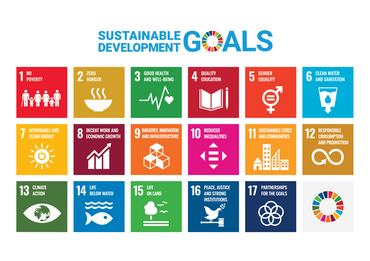Since 2018, there has been a cooperation between katho and CHRIST (Deemed to be University) in Bangalore, India, which was established via the International Federation of Catholic Universities (IFCU). An intensive and lasting collaboration has already been established in recent years. In the period 2023 - 2026, the project “SoL - Social Responsibility and Leadership in Community” will take place as part of the DAAD funding program “SDG Partnerships”. The funds from the funding program will enable the two universities to expand their existing activities.
In order to intensify partnerships between German universities and universities in developing and emerging countries that contribute to sustainable development in the sense of the 2030 Agenda, to the implementation of the Sustainable Development Goals (SDGs) and to the establishment of efficient and internationally networked universities in the partner countries, a common interest is required despite all differences and diversity. The basis is not a one-way street, but reciprocity as well as openness and a willingness to learn from and with each other. This is something that has connected katho and CHRIST (Deemed to be University) since the beginning of their collaboration. The project acronym “SoL”, which is similar in pronunciation to the word “soul”, is also intended to illustrate these principles of cooperation and the social responsibility of both universities.
The practical implementation of the topic of social responsibility is planned jointly by katho and the Sociology and Social Work Department at CHRIST. Katho and CHRIST offer joint courses and internships that deal with social work topics such as social inequalities, human rights, child protection, violence and social entrepreneurship. The courses are offered either digitally or in person. As a result of such a joint course on violence against girls and women, an anthology on gender-based violence in India and Germany is being prepared by colleagues from both universities. In addition, joint conferences on the topic of socio-ecological sustainability are being planned.
The SoL project refers to the SDGs of the United Nations. At CHRIST in Bangalore, specific SDG-related projects are currently being planned, developed and implemented in areas with precarious living situations. Here, the SDG goals “No poverty” (SDG 1), “Quality education” (SDG 4), “Gender equality” (SDG 5), “Clean water and sanitation” (SDG 6), “Affordable and clean energy” (SDG 7) and “Partnerships to achieve the goals” (SDG 17) are brought to life and measures for sustainability are developed, implemented and tested for practicability in the specific living environment of the addressees. For instance, in the DREAMS sub-project, katho and CHRIST social work students visit schools to identify pupils' dreams and goals for the future and support them in realizing their dreams. These numerous activities are documented. In all these areas, the idea of the local is combined with the global. After all, social work professionals who accompany and support people in their social spaces are confronted with global development in a local environment.
The binding cooperation between the university management teams in the area of leadership and social responsibility enables the planning, development and implementation of a strong university partnership. The aim is to promote the SDG-related further development of structures at CHRIST and katho in teaching as well as in university and science management. In addition, the aim is to jointly develop solutions for the challenges faced by people in precarious living conditions in Bangalore. The joint Centre for Ecological and Social Responsibility (CESS) was founded in November 2024 to structurally anchor these objectives at both universities and in the spirit of global cooperation across continents.
Interested colleagues, practitioners and academics are welcome to contact the project manager Prof. Dr. Grit Höppner.
University partnership with CHRIST University in India: Winter School on sustainability
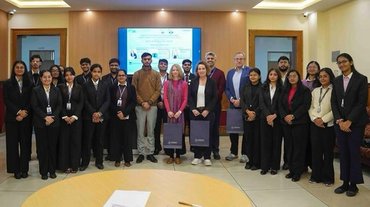
As part of the further expansion of the university partnership with Christ University, Prof. Dr. Anja Kannegießer, Prof. Dr. Grit Höppner, and Prof. Dr. Jörg Rövekamp-Wattendorf taught at the Delhi NCR Campus in Ghaziabad in December 2025. There, they conducted a three-day winter school on the topic of “Sustainability of Young and Old in Times of Climate Change” with master's students from the psychology, management, and law programs.
to the News from January 6, 2025
Focus on child protection: International conference strengthens cooperation in Bangalore
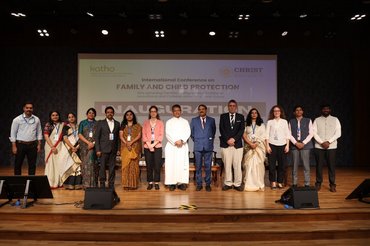
On November 20 and 21, 2025, the International Conference on Family and Child Protection “Strengthening Families, Safeguarding Childhood: Innovations and Collaborations for a Safer Future” took place in Bangalore, India. It was organized by CHRIST (deemed to be University), India, in collaboration with katho.
to the News from January 05, 2026
University partnership with CHRIST University: Teaching by Prof. Haase and Prof. Jox in Lavasa
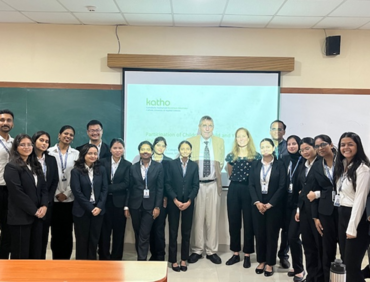
CHRIST University in India hosted an International Staff Week in Lavasa from November 10 to November 15, 2025. Teachers from 17 countries across all continents were invited to present and discuss various current topics with students. Prof. Dr. Haase from the Münster department and Prof. Dr. Jox from the Cologne department participated on behalf of the Catholic University of Applied Sciences.
to the News from January 5, 2026
Project “DREAMS” launched between katho in Münster and Geschwister-Scholl-Realschule Münster
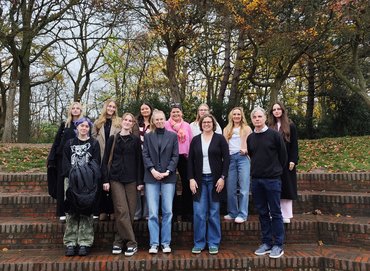
Since November 7, 2025, the Geschwister-Scholl-Realschule secondary school in Münster-Kinderhaus has been running the project “DREAMS—When Children Dream.” It is being carried out in collaboration with the Catholic University of Applied Sciences in Münster.
to the News from December 12, 2025
University partnership with Christ University in India: Prof. Dr. Jox taught at Winter School
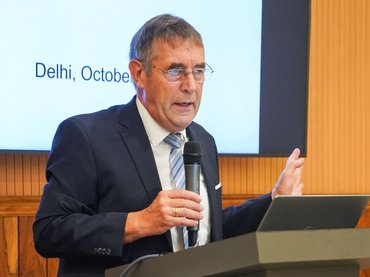
As part of the further expansion of the university partnership with Christ University, the law professor (Department of Social Work, Cologne) taught again at the Delhi-NCR Campus in Ghaziabad in October 2025. During a winter school, questions and issues related to the UN's sustainable development goals were discussed.
to the News from November 24, 2025
Participation of katho students in Summer School at our partner university CHRIST (Deemed to be University) in Bangalore, India
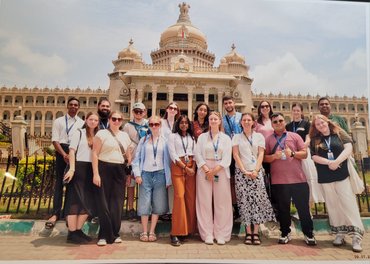
From July to August 2025, two students from the Catholic University of Applied Sciences in Münster and Cologne had the opportunity to attend a summer school lasting several weeks at our partner university CHRIST (Deemed to be University) in Bangalore, India. Together with 12 other students from various countries, they attended different seminars in the field of social and cultural sciences and gained insights into practical social work on site. Excursions were also part of the program. Participation in the summer school was financially supported by the SoL project.
Video of the joint seminar “Violence against children and women: Indian and German Perspectives”
The seminar “Violence against children and women: Indian and German Perspectives” for katho and Christ students and other incoming students was held in the summer semester of 2025 (June) by Prof. Dr. Judith Haase and Prof. Dr. Grit Höppner. The video provides insights into the seminar work.
Participation in the NammaNeeru Marathon in Bangalore
The NammaNeeru Marathon took place in Bangalore on 12.01.2025. Over 800 students, lecturers and residents of Bangalore took part. The aim was to raise awareness for the protection and careful use of water in Bangalore. Slogans, posters and eco-friendly materials were used to educate participants about sustainable water practices. The event received a lot of media attention. The marathon was organized by the Department of Sociology and Social Work, CHRIST University, and the CESS, Center for Ecological and Social Sustainability.
Further Activities
- Publication of a digital advent calendar by the Centre for Ecological and Social Sustainability on sustainability activities at katho and CHRIST University
- katho and CHRIST University to open the Centre for Ecological and Social Sustainability / CESS in November 2024
- Guest lectureship of Prof. Jox at Christ University in 2024
- Guest lectureships by Prof, Anja Kannegießer, Prof. Jörg Rövekamp and Prof. Grit Höppner in Dec. 2023 at CHRIST
- Guest lectureship of Prof. Jox at Christ University in 2023
- DREAMS project: 2nd workshop week on the topics of family, friendship, teamwork and society with pupils from Hölderlin-Gymnasium and Ferdinand-Lassalle-Realschule in October 2022
- DREAMS project: 1st workshop week on the topic of strengthening resilience with pupils from Hölderlin-Gymnasium and Ferdinand-Lassalle-Realschule in April 2022
- Joint seminar “Understanding social problems and developing solutions: German and South Indian perspectives” by students from katho and CHRIST in winter semester 2021/22
- Virtual reality as a cooperation project between katho and Christ University
Projekt Manager
Prof. Dr. Grit Höppner
Gleichstellungsbeauftragte
Münster, Sozialwesen
-
+49 251 41767-67
-
g.hoeppner(at)katho-nrw.de
-
Room R 209
-
nach Vereinbarung
-
profile site
With funding from the Federal Ministry for Economic Cooperation and Development (BMZ), the DAAD promotes university partnerships in Sustainable Development Goals (SDG)-relevant subject areas that contribute to sustainable development in the sense of the SDGs and to the development of efficient and cosmopolitan universities in the partner countries and in Germany.
As part of the funding, teaching, research and university management are to be structurally strengthened at the partner institutions and study programs in areas of particular importance for sustainable development are to be developed and expanded.
Pictures and photos of the project
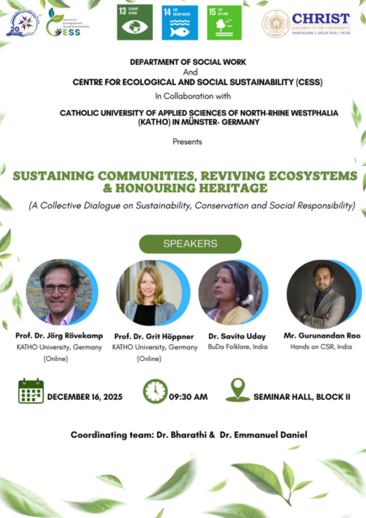 On December 16, the symposium “Sustaining Communities, Reviving Ecosystems, Honoring Heritage: A Collective Dialogue on Sustainability, Conservation, and Social Responsibility” took place at the Bangalore campus. Prof. Jörg Rövekamp-Wattendorf and Prof. Grit Höppner gave online lectures on sustainability.
On December 16, the symposium “Sustaining Communities, Reviving Ecosystems, Honoring Heritage: A Collective Dialogue on Sustainability, Conservation, and Social Responsibility” took place at the Bangalore campus. Prof. Jörg Rövekamp-Wattendorf and Prof. Grit Höppner gave online lectures on sustainability.
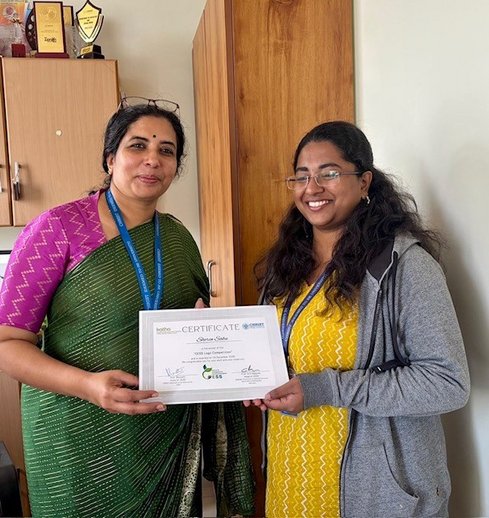 Within this framework, the design for a logo for the Centre for Ecological and Social Sustainability (CESS) by a student at Christ University was chosen (Prof. Bharathi on the left, student Sherin Sabu on the right).
Within this framework, the design for a logo for the Centre for Ecological and Social Sustainability (CESS) by a student at Christ University was chosen (Prof. Bharathi on the left, student Sherin Sabu on the right).
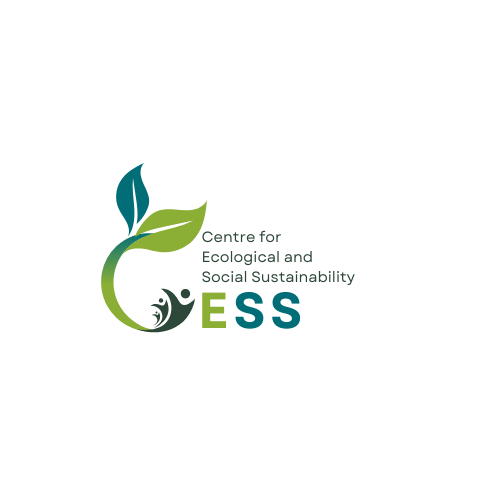 The logo of the Center for Ecological and Social Sustainability (CESS)
The logo of the Center for Ecological and Social Sustainability (CESS)
 In mid-December, Prof. Dr. Anja Kannegießer, Prof. Dr. Grit Höppner, and Prof. Dr. Jörg Rövekamp-Wattendorf held a three-day winter school on the topic of “Sustainability of Young and Old in Times of Climate Change” at Christ University's Delhi NCR Campus with master's students from the psychology, management, and law programs.
In mid-December, Prof. Dr. Anja Kannegießer, Prof. Dr. Grit Höppner, and Prof. Dr. Jörg Rövekamp-Wattendorf held a three-day winter school on the topic of “Sustainability of Young and Old in Times of Climate Change” at Christ University's Delhi NCR Campus with master's students from the psychology, management, and law programs.
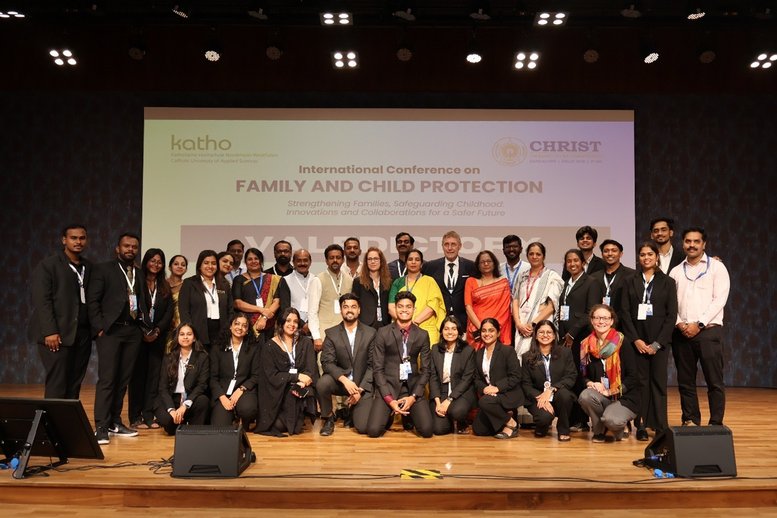 On November 20 and 21, 2025, Christ University in Bangalore hosted the International Conference on Family and Child Protection, entitled “Strengthening Families, Safeguarding Childhood: Innovations and Collaborations for a Safer Future.” The conference was organized jointly by Christ University and katho.
On November 20 and 21, 2025, Christ University in Bangalore hosted the International Conference on Family and Child Protection, entitled “Strengthening Families, Safeguarding Childhood: Innovations and Collaborations for a Safer Future.” The conference was organized jointly by Christ University and katho.
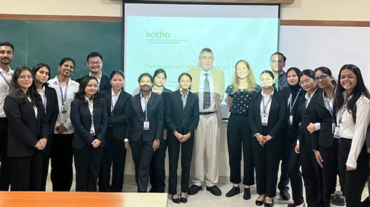 CHRIST University in India hosted an International Staff Week in Lavasa from November 10 to 15, 2025. Teachers from 17 countries across all continents were invited to present and discuss various current topics with students. Prof. Dr. Haase from the Münster department and Prof. Dr. Jox from the Cologne department participated on behalf of the Catholic University.
CHRIST University in India hosted an International Staff Week in Lavasa from November 10 to 15, 2025. Teachers from 17 countries across all continents were invited to present and discuss various current topics with students. Prof. Dr. Haase from the Münster department and Prof. Dr. Jox from the Cologne department participated on behalf of the Catholic University.
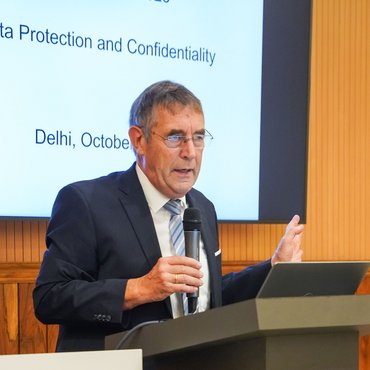 As part of the further expansion of the university partnership with Christ University, law professor Rolf Jox (Department of Social Work, Cologne) taught again at the Delhi-NCR Campus in Ghaziabad in October 2025.
As part of the further expansion of the university partnership with Christ University, law professor Rolf Jox (Department of Social Work, Cologne) taught again at the Delhi-NCR Campus in Ghaziabad in October 2025.
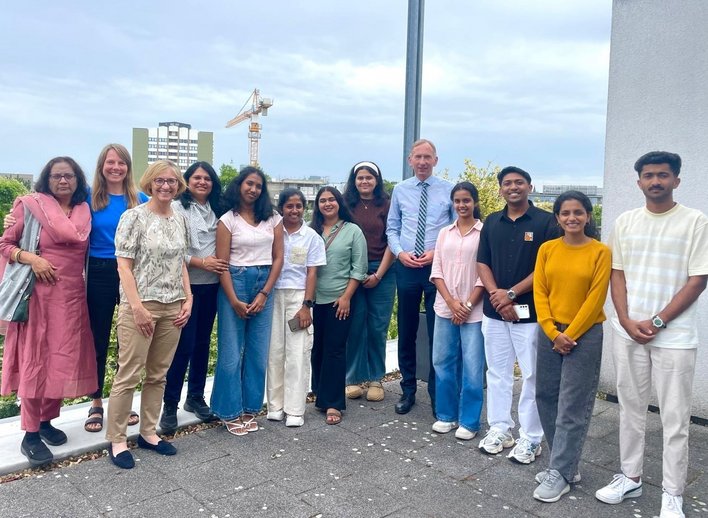 Eight students and two lecturers from CHRIST (Deemed to be University) met with Rector Prof. Dr. Barbara Schermaier-Stöckl and Chancellor Bernward Robrecht in June 2025 as part of an excursion to katho Münster.
Eight students and two lecturers from CHRIST (Deemed to be University) met with Rector Prof. Dr. Barbara Schermaier-Stöckl and Chancellor Bernward Robrecht in June 2025 as part of an excursion to katho Münster.
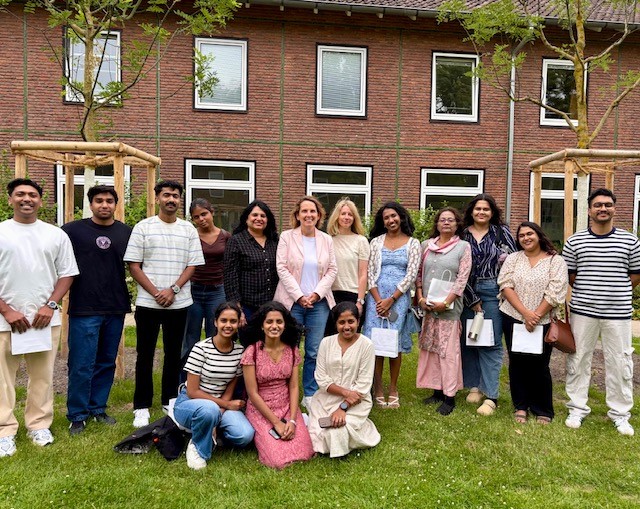 The Indian excursion participants together with three of the four incoming CHRIST students at the katho campus in Münster: Nikhil Santosh (2nd from left at the back), Harshita Sreedhar (4th from left at the back), Cyril Kurian Philip (1st from right at the back); not in the picture: Abel Jacob, he took the photo. Also: Prof. Dr. Princy Thomas (5th from left at the back), Dean of the Münster site Prof. Dr. Anja Kannegießer (6th from left at the back), Prof. Dr. Grit Höppner (7th from left at the back) and Prof. Dr. Hemalatha K (4th from right at the back).
The Indian excursion participants together with three of the four incoming CHRIST students at the katho campus in Münster: Nikhil Santosh (2nd from left at the back), Harshita Sreedhar (4th from left at the back), Cyril Kurian Philip (1st from right at the back); not in the picture: Abel Jacob, he took the photo. Also: Prof. Dr. Princy Thomas (5th from left at the back), Dean of the Münster site Prof. Dr. Anja Kannegießer (6th from left at the back), Prof. Dr. Grit Höppner (7th from left at the back) and Prof. Dr. Hemalatha K (4th from right at the back).
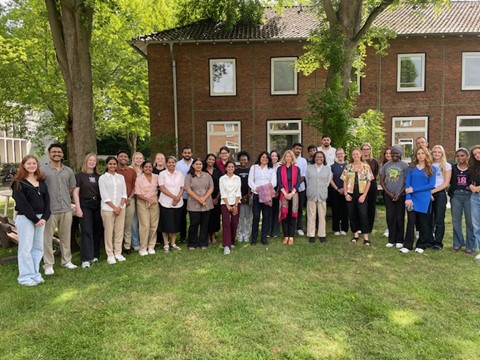 As part of a three-day block seminar on the topic of “Violence against Children and Women”, students and lecturers from CHRIST (Deemed to be University) exchanged views on the topics of child and violence protection. In addition to students from katho and CHRIST, other students from Ghana, Sweden, Ukraine and Turkey also took part in the “Violence against Children and Women” block seminar.
As part of a three-day block seminar on the topic of “Violence against Children and Women”, students and lecturers from CHRIST (Deemed to be University) exchanged views on the topics of child and violence protection. In addition to students from katho and CHRIST, other students from Ghana, Sweden, Ukraine and Turkey also took part in the “Violence against Children and Women” block seminar.
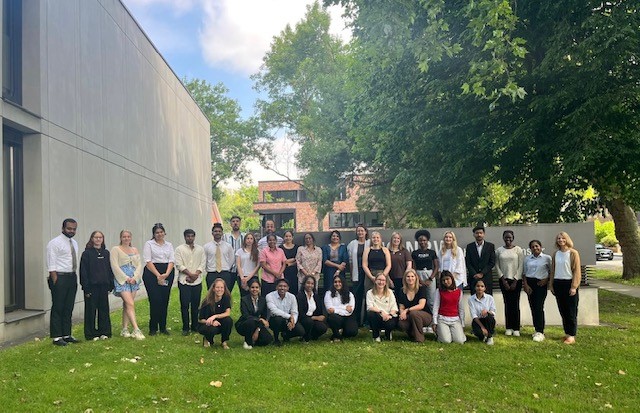 Another picture of the katho students and international participants of the block seminar “Violence against Children and Women”.
Another picture of the katho students and international participants of the block seminar “Violence against Children and Women”.
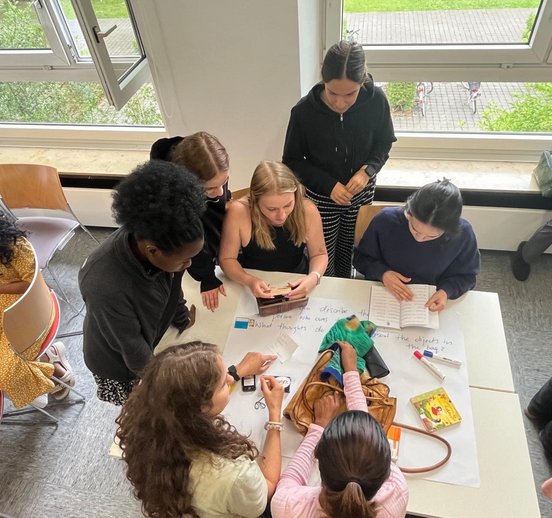 On the second day of the seminar, the topics of violence against women, protection against violence and empowerment of women through social entrepreneurship were explored in greater depth through inputs and “rummage tables”.
On the second day of the seminar, the topics of violence against women, protection against violence and empowerment of women through social entrepreneurship were explored in greater depth through inputs and “rummage tables”.
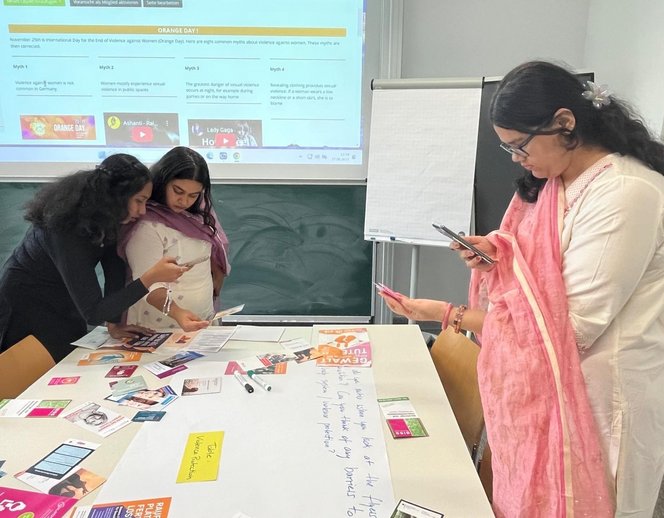 At one table each, myths about violence against women, life situations of women affected by violence, digital violence and the help system in Germany were made tangible.
At one table each, myths about violence against women, life situations of women affected by violence, digital violence and the help system in Germany were made tangible.
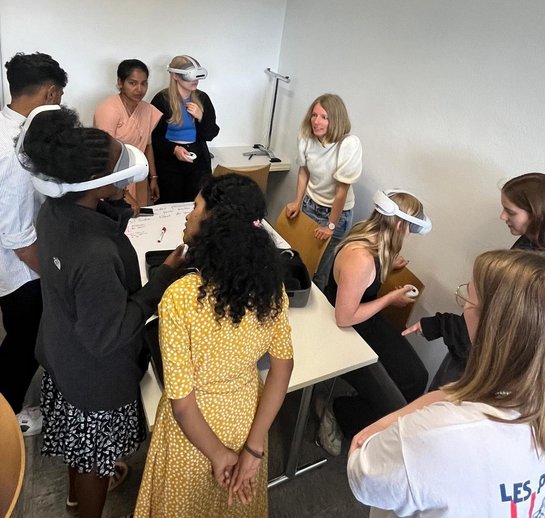 In addition, virtual reality glasses were used at a table, in which video presentations on the topic were available, which had previously been filmed by students, supported by the Digital Learning and Services Center at katho and CHRIST.
In addition, virtual reality glasses were used at a table, in which video presentations on the topic were available, which had previously been filmed by students, supported by the Digital Learning and Services Center at katho and CHRIST.
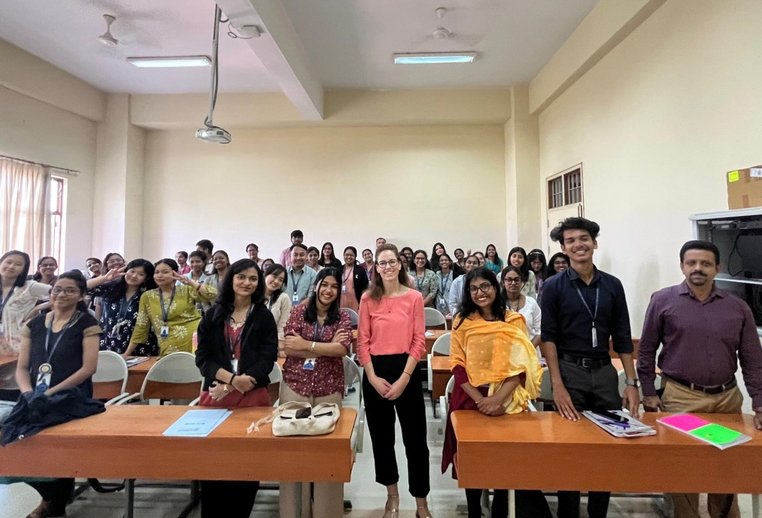 Prof. Dr. Judith Haase gave lectures on child and youth welfare in Germany and the organization of child protection work at the Central Campus Bangalore/CHRIST (Deemed to be University) in November 2024.
Prof. Dr. Judith Haase gave lectures on child and youth welfare in Germany and the organization of child protection work at the Central Campus Bangalore/CHRIST (Deemed to be University) in November 2024.
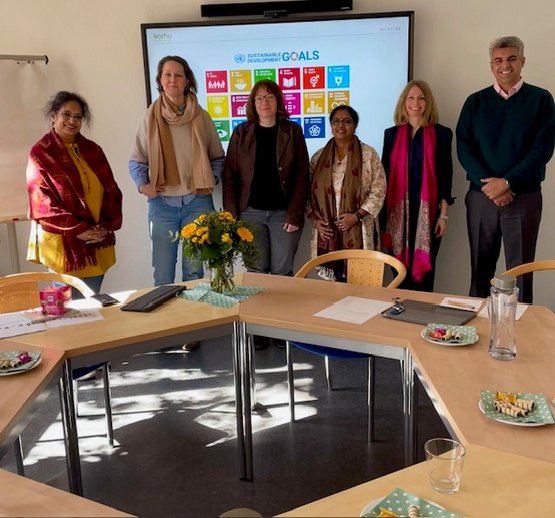 The three-day midterm workshop of the SoL project took place at katho, Münster campus, at the end of March 2025. Prof. Dr. Suparna Kar, Prof. Dr. Maya Mohandas (both Bangalore campus) and Prof. Dr. Kushagra Mishra (Delhi campus) took part on the part of Christ (Deemed to be University), Prof. Dr. Grit Höppner and two colleagues from the Sunrise Lab, Prof. Dr. Swantje Notzon and Dr. Milena Jostmeier, took part on the part of katho.
The three-day midterm workshop of the SoL project took place at katho, Münster campus, at the end of March 2025. Prof. Dr. Suparna Kar, Prof. Dr. Maya Mohandas (both Bangalore campus) and Prof. Dr. Kushagra Mishra (Delhi campus) took part on the part of Christ (Deemed to be University), Prof. Dr. Grit Höppner and two colleagues from the Sunrise Lab, Prof. Dr. Swantje Notzon and Dr. Milena Jostmeier, took part on the part of katho.
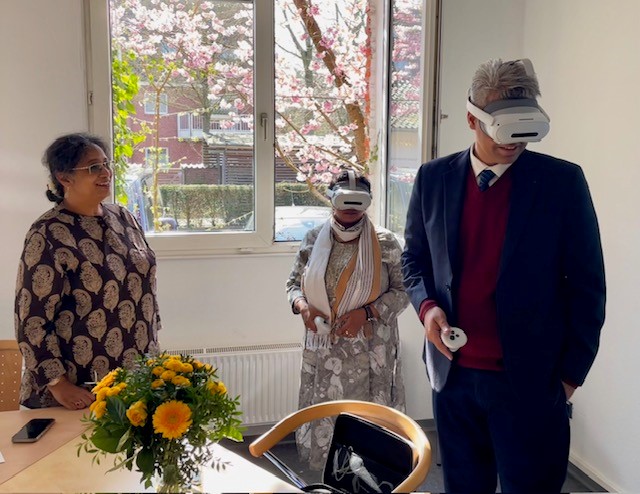 The Indian colleagues look at the teaching and learning material produced in the SoL project in virtual reality.
The Indian colleagues look at the teaching and learning material produced in the SoL project in virtual reality.
 Guest Lectureship on the SDGs “Quality Education”, “Gender Equality” and “Affordable and Clean Energy” by Prof. Bharathi at the katho department in Münster. Topics were social work in India, the role of social work in strengthening democracies and women and sustainable living environments, December 2024.
Guest Lectureship on the SDGs “Quality Education”, “Gender Equality” and “Affordable and Clean Energy” by Prof. Bharathi at the katho department in Münster. Topics were social work in India, the role of social work in strengthening democracies and women and sustainable living environments, December 2024.
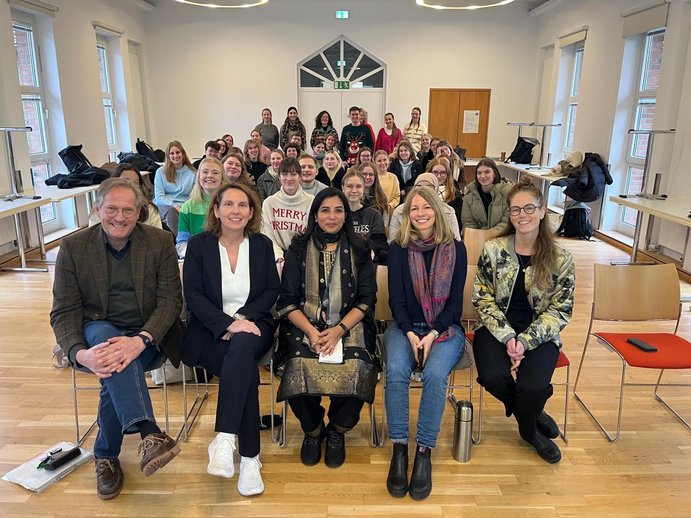 Group photo for the Guest Lectureship on the SDGs “Quality Education”, “Gender Equality” and “Affordable and Clean Energy” by Prof. Bharathi at the katho department in Münster in December 2024.
Group photo for the Guest Lectureship on the SDGs “Quality Education”, “Gender Equality” and “Affordable and Clean Energy” by Prof. Bharathi at the katho department in Münster in December 2024.
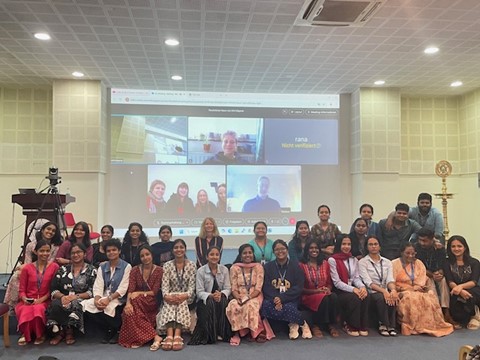 One-semester course on the SDGs “No Poverty”, “Quality Education” and “Gender Equality”, jointly held by Prof. Dr. Grit Höppner and Prof. Dr. Hemalatha K. entitled “Understanding Social Problems and Developing Solutations: South Indian and German Perspectives”. A teaching unit took place in November 2024 at the Central Campus Bangalore/CHRIST (Deemed to be University) in hybrid format.
One-semester course on the SDGs “No Poverty”, “Quality Education” and “Gender Equality”, jointly held by Prof. Dr. Grit Höppner and Prof. Dr. Hemalatha K. entitled “Understanding Social Problems and Developing Solutations: South Indian and German Perspectives”. A teaching unit took place in November 2024 at the Central Campus Bangalore/CHRIST (Deemed to be University) in hybrid format.
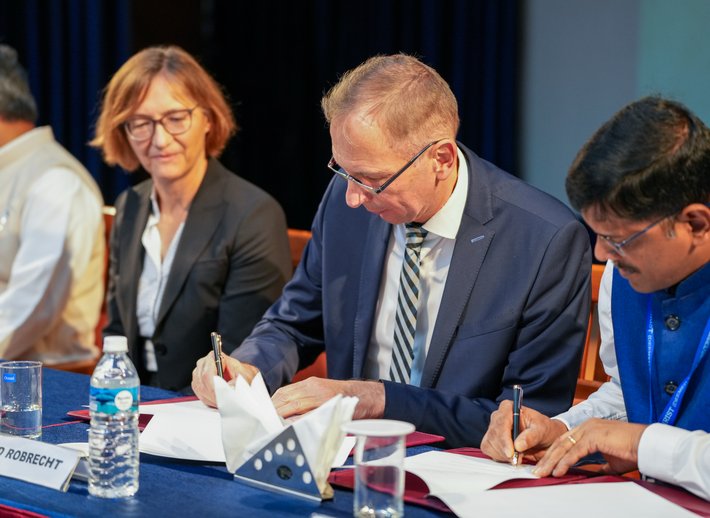 Chancellor Bernward Robrecht, Rector Barbara Schermaier-Stöckl and their Indian colleagues sign the Collaboration Agreement for the Centre for Ecological and Social Sustainability (CESS) in November 2024.
Chancellor Bernward Robrecht, Rector Barbara Schermaier-Stöckl and their Indian colleagues sign the Collaboration Agreement for the Centre for Ecological and Social Sustainability (CESS) in November 2024.
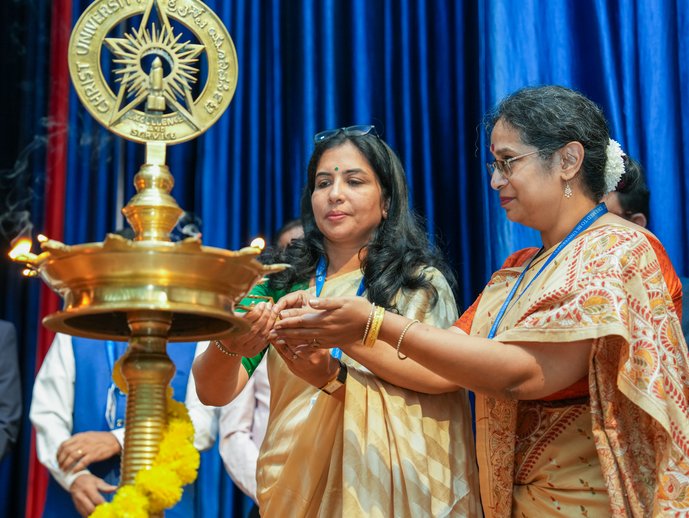 Prof. Bharathi (left) and Prof. Suparna (right) light a candle.
Prof. Bharathi (left) and Prof. Suparna (right) light a candle.
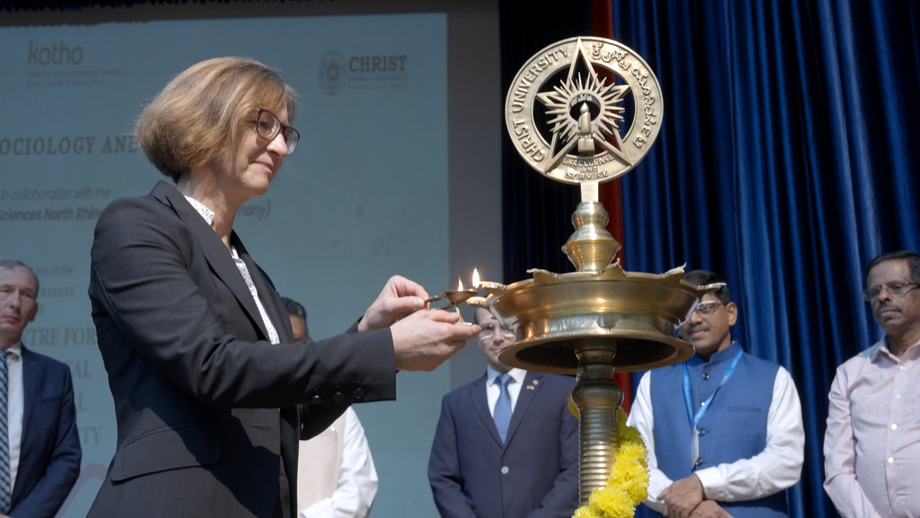 Barbara Schermaier-Stöckl, principal of katho, lights a candle.
Barbara Schermaier-Stöckl, principal of katho, lights a candle.
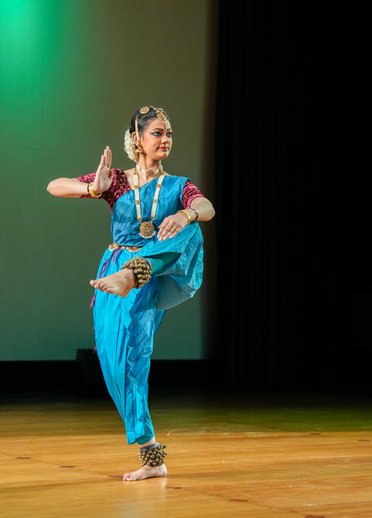 The opening of the CESS was accompanied by a dance.
The opening of the CESS was accompanied by a dance.
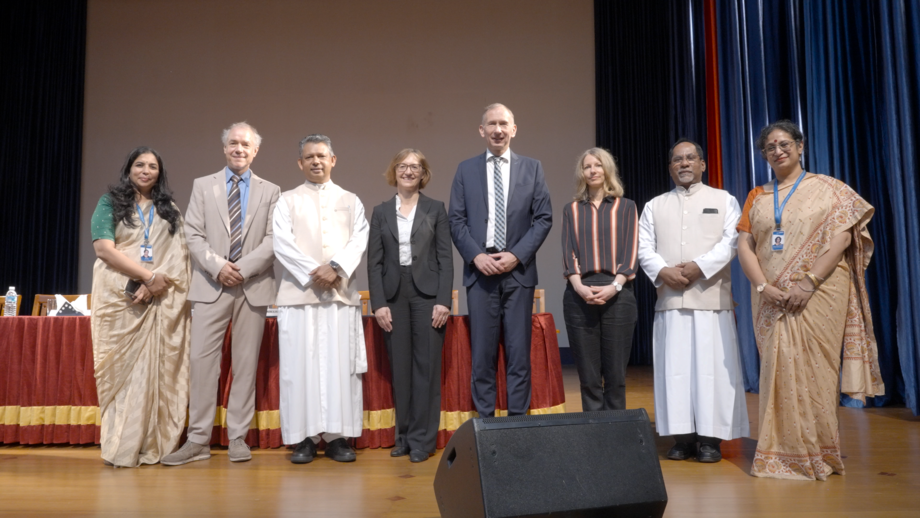 Founders of the CESS in the large event hall
Founders of the CESS in the large event hall
 Trees were planted in 2023 in the context of the collaboration with E-Cure.
Trees were planted in 2023 in the context of the collaboration with E-Cure.
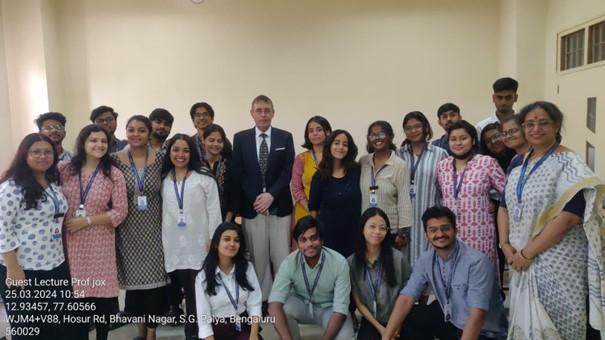 Prof. Dr. Jox taught at the Central Campus in Bangalore at the end of March 2024 and at the Lavasa/Pune Campus, CHRIST (Deemed to be University) at the beginning of April 2024. The content of the courses was issues related to the Sustainable Development Goals “Health and Well-being” and “Peace, Justice and Strong Institutions”.
Prof. Dr. Jox taught at the Central Campus in Bangalore at the end of March 2024 and at the Lavasa/Pune Campus, CHRIST (Deemed to be University) at the beginning of April 2024. The content of the courses was issues related to the Sustainable Development Goals “Health and Well-being” and “Peace, Justice and Strong Institutions”.
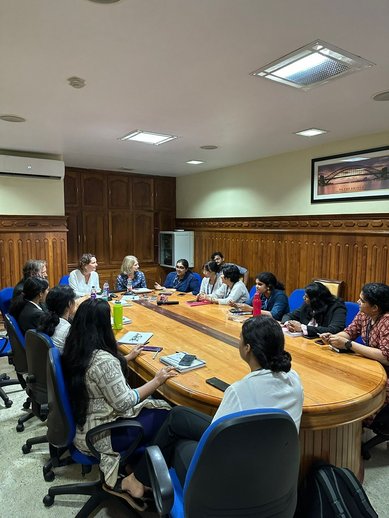 One-semester course by katho and CHRIST students on the SDG “Gender Equality”, entitled: Violence against girls, women and the elderly: Sustainable Protection Options for Vulnerable Groups from Indian and German Perspectives, by Prof. Dr. Grit Höppner, Prof. Dr. Anja Kannegießer and Prof. Dr. Jörg Rövekamp-Wattendorf. One teaching unit took place in December 2023 at the Central Campus Bangalore/CHRIST (Deemed to be University) in hybrid format.
One-semester course by katho and CHRIST students on the SDG “Gender Equality”, entitled: Violence against girls, women and the elderly: Sustainable Protection Options for Vulnerable Groups from Indian and German Perspectives, by Prof. Dr. Grit Höppner, Prof. Dr. Anja Kannegießer and Prof. Dr. Jörg Rövekamp-Wattendorf. One teaching unit took place in December 2023 at the Central Campus Bangalore/CHRIST (Deemed to be University) in hybrid format.
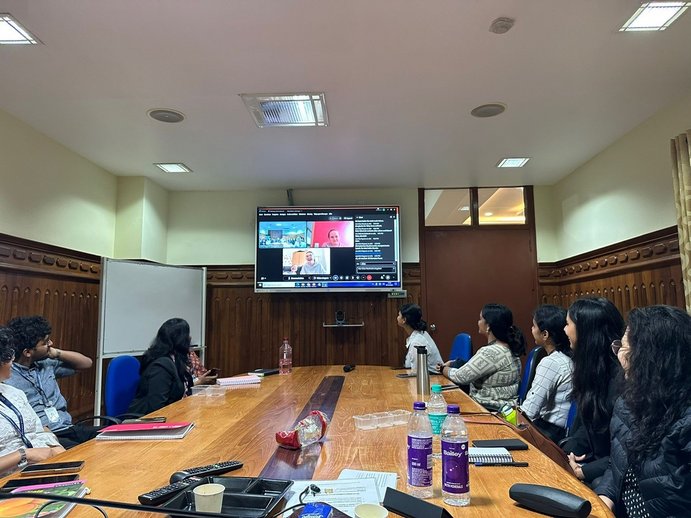 Further insights from the one-semester course by katho and CHRIST students on the SDG “Gender Equality”.
Further insights from the one-semester course by katho and CHRIST students on the SDG “Gender Equality”.
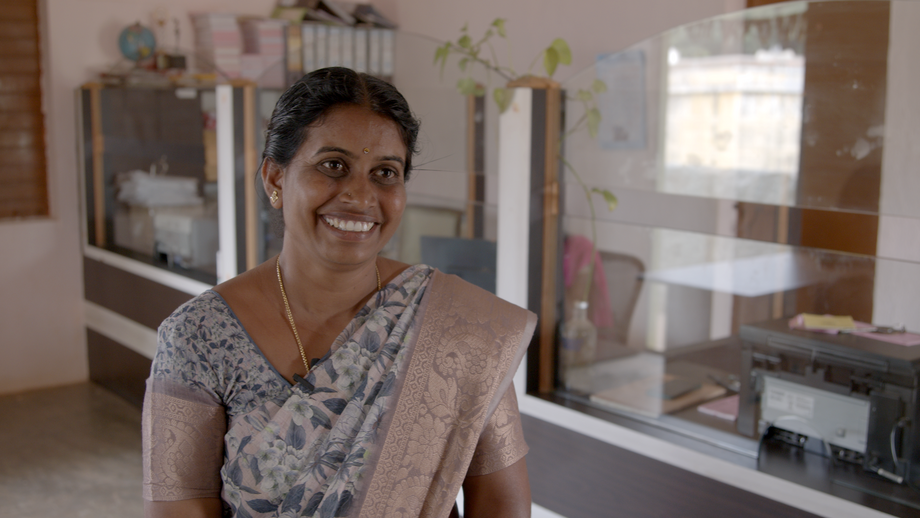 The Chethana project in the rural village of Hoskote, which lives primarily from agriculture, is a combination of social work and female empowerment. In the Indian context, social work is always considered in economic terms. After all, how can social grievances be overcome if the necessary funding is not available? This is how a small, independent bank was founded by the women of the village, into which a large number of farmers and families in the surrounding area pay and store their money.
The Chethana project in the rural village of Hoskote, which lives primarily from agriculture, is a combination of social work and female empowerment. In the Indian context, social work is always considered in economic terms. After all, how can social grievances be overcome if the necessary funding is not available? This is how a small, independent bank was founded by the women of the village, into which a large number of farmers and families in the surrounding area pay and store their money.
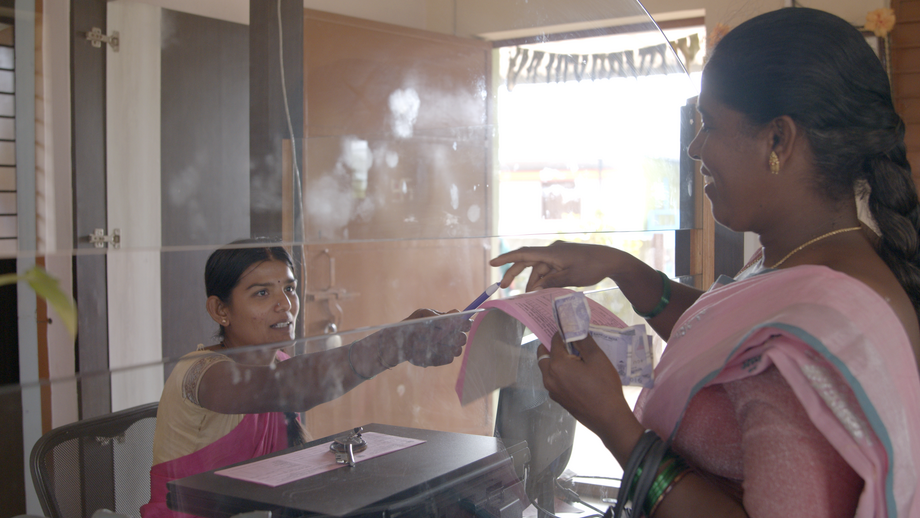 This capital makes it possible to disburse microloans at low interest rates to members of the community. These in turn create the basis for buying seeds and equipment for farmers, for example.
This capital makes it possible to disburse microloans at low interest rates to members of the community. These in turn create the basis for buying seeds and equipment for farmers, for example.
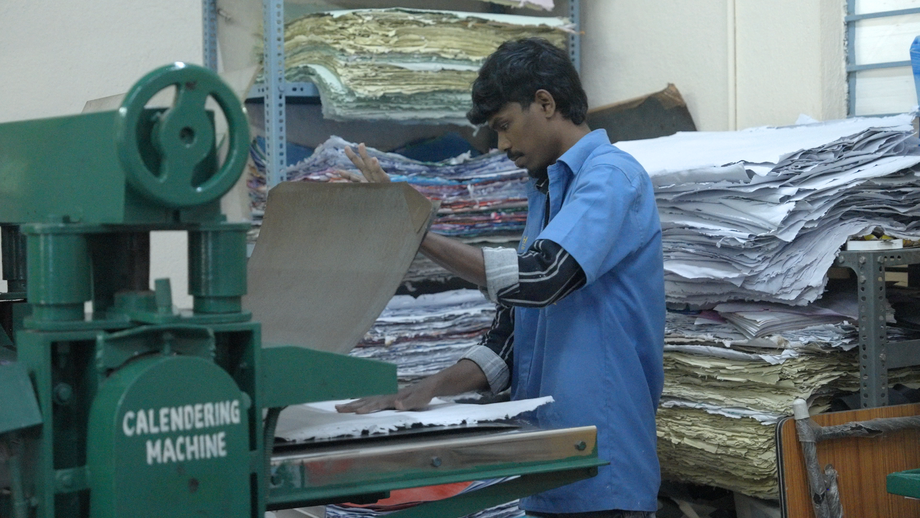 The Parivarthana (“change”) project at CHRIST in Bangalore aims to recover new resources from the paper waste generated daily by the 20,000-student campus. After the CHRIST team has sorted the paper waste, separated it from metals and plastic and softened it, it is used to layer the fibers into new sheets of paper.
The Parivarthana (“change”) project at CHRIST in Bangalore aims to recover new resources from the paper waste generated daily by the 20,000-student campus. After the CHRIST team has sorted the paper waste, separated it from metals and plastic and softened it, it is used to layer the fibers into new sheets of paper.
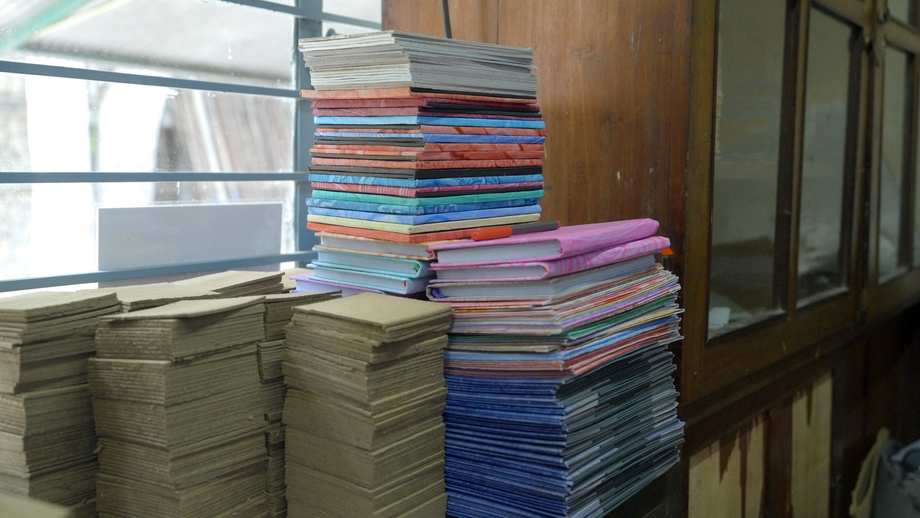 New exercise books and other learning materials are produced daily from the large quantities of paper waste that accumulate on campus every day. These are sold in a store on campus.
New exercise books and other learning materials are produced daily from the large quantities of paper waste that accumulate on campus every day. These are sold in a store on campus.
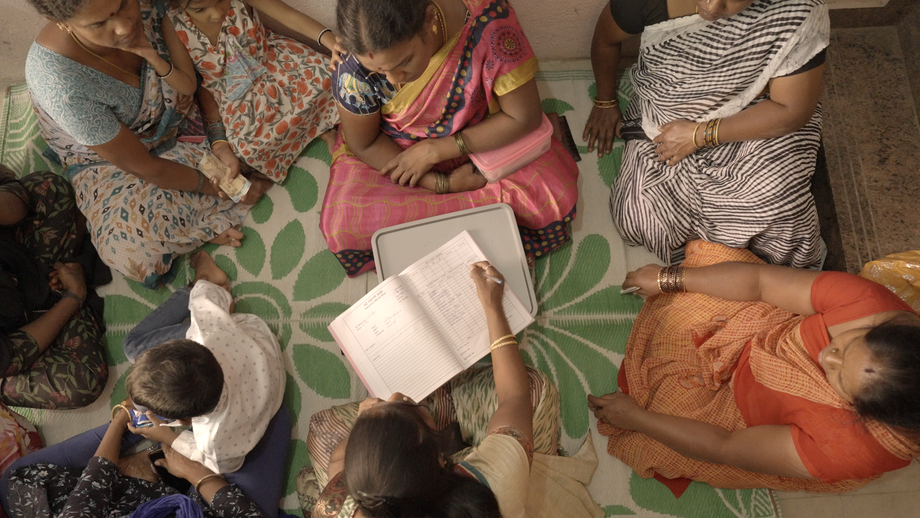 The principle of SHGs (Self Help Groups), which social workers have established in urban slums in Bangalore and elsewhere, is very simple: a group of women is formed under guidance and comes together as a savings association. An account is opened together, money is regularly paid into it and the group discusses which member should next receive financial support from the money collected by the SHG.
The principle of SHGs (Self Help Groups), which social workers have established in urban slums in Bangalore and elsewhere, is very simple: a group of women is formed under guidance and comes together as a savings association. An account is opened together, money is regularly paid into it and the group discusses which member should next receive financial support from the money collected by the SHG.
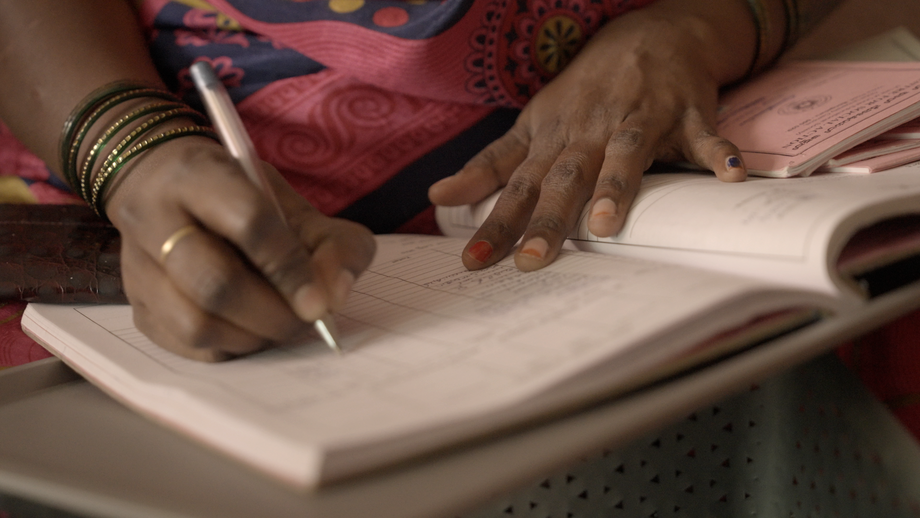 The financial support from the Self Help Group is used both to pay for professional investment costs and for the private purposes of the women involved. This support must be repaid within a certain period of time. Votes and decisions are made democratically and as a community in the SHG. In this way, SHGs not only promote the financial independence of these women, but also social cohesion in the neighborhood.
The financial support from the Self Help Group is used both to pay for professional investment costs and for the private purposes of the women involved. This support must be repaid within a certain period of time. Votes and decisions are made democratically and as a community in the SHG. In this way, SHGs not only promote the financial independence of these women, but also social cohesion in the neighborhood.
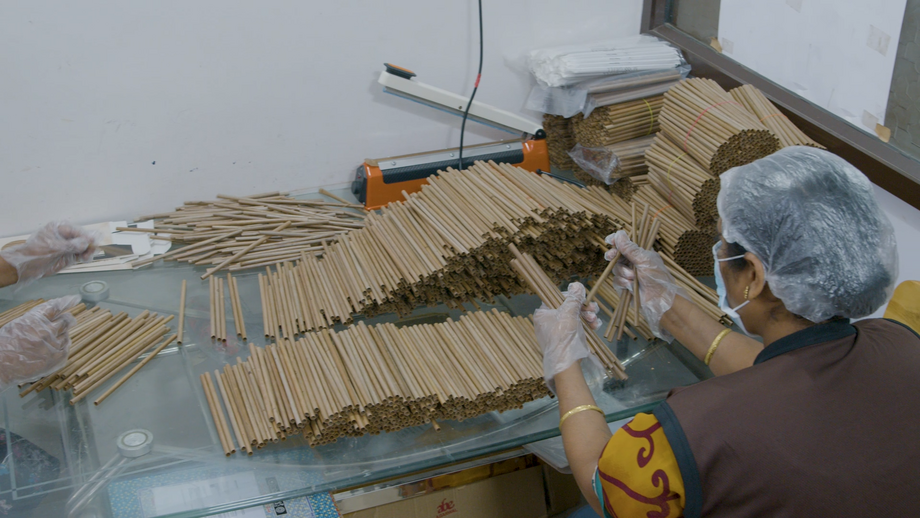 The idea for the straws actually came to English professor Saji Varghese by chance when he looked at the coconut leaves on the CHRIST campus. Instead of burning coconut leaves, he thought, wouldn't it be better to twist them into straws? The simple idea turned into a fast-growing start-up that addresses several aspects of sustainability at once. In India, coconut leaves are both a waste product and a renewable resource. By collecting the leaves, farmers can earn an extra wage, for example. CHRIST helped to develop machines to turn the leaves into straws. These machines are not located in large factories, but are specifically set up in rural communities to provide women in particular with a job that is compatible with their families, thereby strengthening them financially.
The idea for the straws actually came to English professor Saji Varghese by chance when he looked at the coconut leaves on the CHRIST campus. Instead of burning coconut leaves, he thought, wouldn't it be better to twist them into straws? The simple idea turned into a fast-growing start-up that addresses several aspects of sustainability at once. In India, coconut leaves are both a waste product and a renewable resource. By collecting the leaves, farmers can earn an extra wage, for example. CHRIST helped to develop machines to turn the leaves into straws. These machines are not located in large factories, but are specifically set up in rural communities to provide women in particular with a job that is compatible with their families, thereby strengthening them financially.
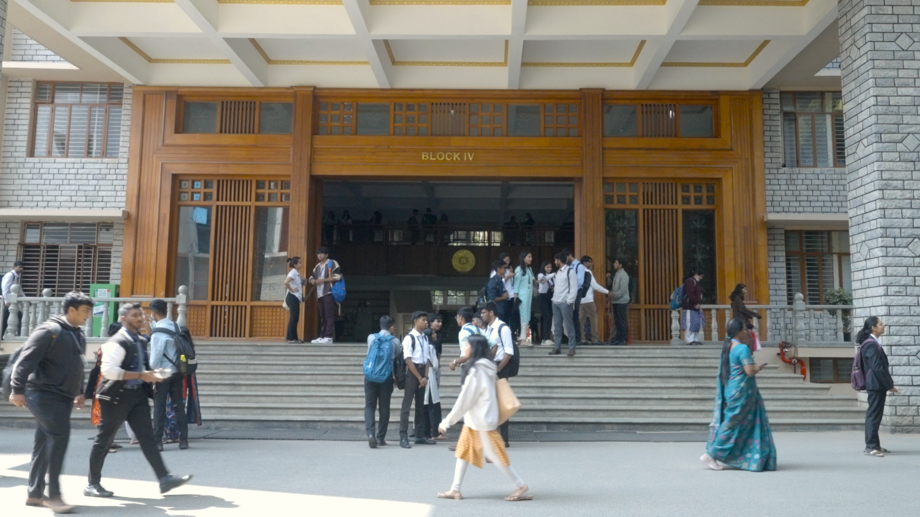 The CHRIST campus in Bangalore.
The CHRIST campus in Bangalore.
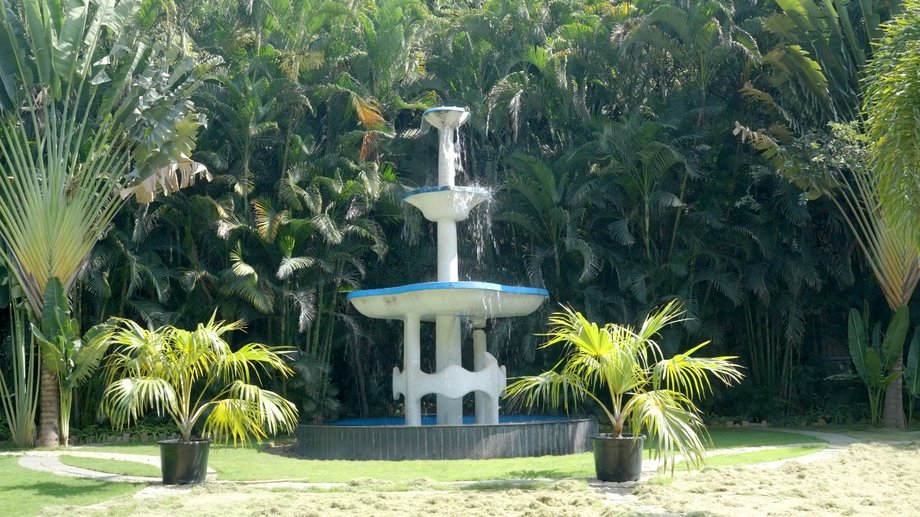 Impressions of the CHRIST campus in Bangalore
Impressions of the CHRIST campus in Bangalore
